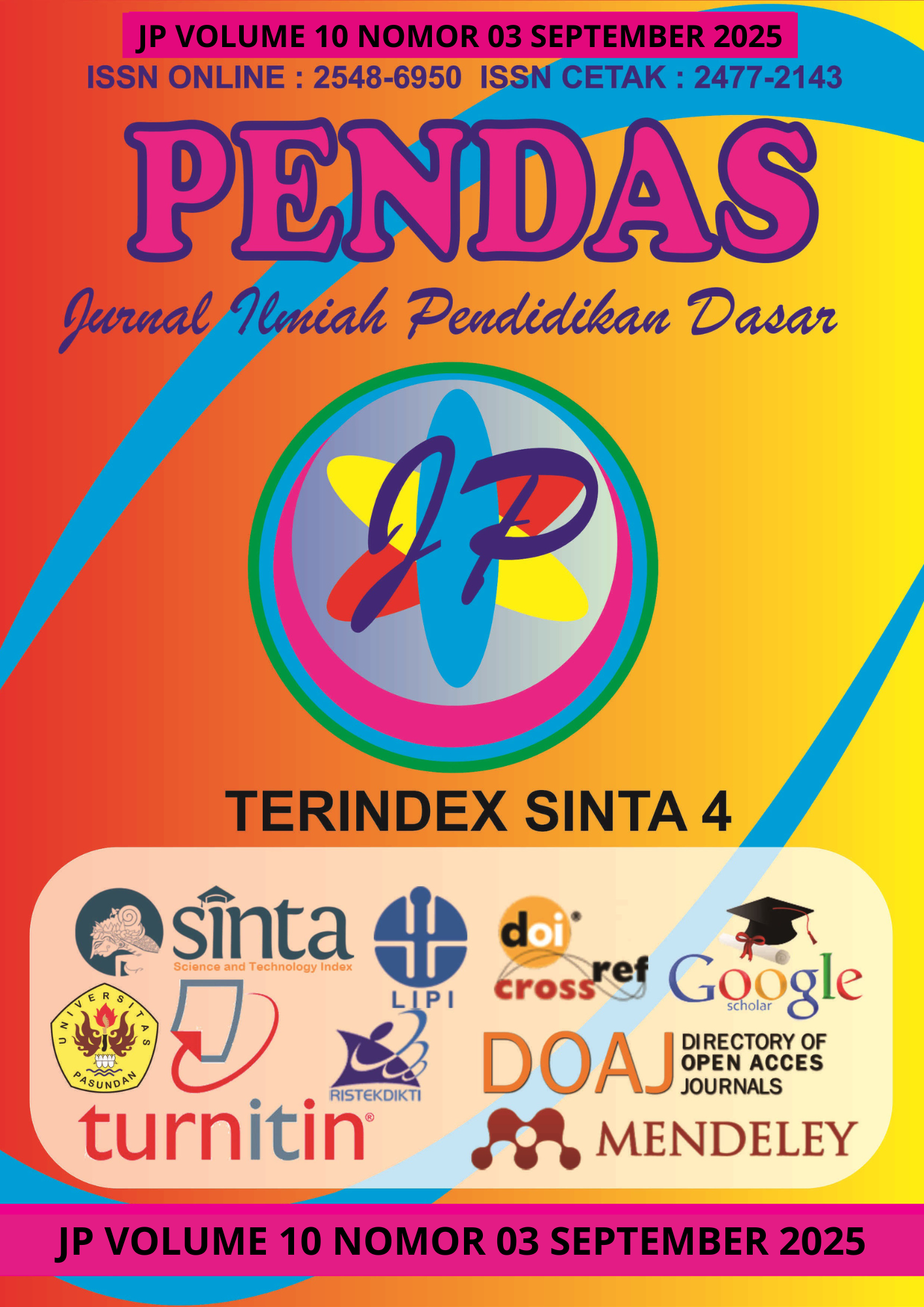IMPLEMENTASI PEMBELAJARAN STEAM PADA MATERI IPA UNTUK MENINGKATKAN MINAT BELAJAR SISWA
DOI:
https://doi.org/10.23969/jp.v10i3.31099Keywords:
science, learning interest, elementary school, systematic literature review (SLR), STEAMAbstract
Science learning at the elementary school level often faces challenges in fostering students’ learning interest. Conventional methods that rely on memorization are considered less effective in cultivating curiosity and active engagement. The STEAM approach emerges as an innovative solution by integrating multiple disciplines in a contextual and project-based manner. This study aims to examine the implementation of STEAM-based learning in elementary science education to enhance students’ learning interest, as well as to identify the challenges in its application. This review employs a qualitative method using a Systematic Literature Review (SLR) approach guided by the PRISMA protocol. Data were obtained from 20 national and international scholarly articles published between 2020 and 2025 that met inclusion criteria: focusing on STEAM implementation in science learning, containing empirical data, and being fully accessible. The results indicate that STEAM is effective in increasing learning interest through creative, collaborative, and experience-based learning activities. Students became more active, motivated, and demonstrated a deeper understanding of science concepts. However, challenges such as limited teacher training, inadequate infrastructure, and curriculum readiness remain significant obstacles. Therefore, improving teacher competencies, developing flexible curricula, and providing adequate facilities are essential efforts to optimize STEAM implementation in elementary schools. This review is limited by its scope and publication range, thus further research with broader and deeper exploration is recommended.
Downloads
References
Adriyawati, Utomo, E., Rahmawati, Y., & Mardiah, A. (2020). Steam-project-based learning integration to improve elementary school students’ scientific literacy on alternative energy learning. Universal Journal of Educational Research, 8(5), 1863–1873. https://doi.org/10.13189/ujer.2020.080523
Aguilera, D., & Ortiz-Revilla, J. (2021). Stem vs. Steam education and student creativity: A systematic literature review. Education Sciences, 11(7). https://doi.org/10.3390/educsci11070331
Alghamdi, A. A. (2023). Exploring Early Childhood Teachers’ Beliefs About STEAM Education in Saudi Arabia. Early Childhood Education Journal, 51(2), 247–256. https://doi.org/10.1007/s10643-021-01303-0
Astuti, D., Wijayanti, A., Purnamasari, V., Pendidikan, F. I., Pgri, U., Abstrak, S., Kulon, S., Di, G., Kita, S., Kulon, S., Kulon, S., Sd, I. V, & Kunci, K. (2025). PENGEMBANGAN MEDIA PEMBELAJARAN INTERAKTIF BERBASIS STEAM DALAM PEMBELAJARAN IPAS KELAS IV “ GAYA DI SEKITAR KITA ” DI SDN 3 SUROKONTO KULON. 5, 302–316.
Azis, I. S., & Munawar, M. (2023). Implementasi Media Pembelajaran Robokids Berbasis STEAM terhadap Minat Dan Prestasi Belajar Siswa Sekolah Dasar. 6(3), 1300–1310. https://doi.org/10.31949/jee.v6i3.6094
Chistyakov, A. A., Kunitsyna, M. L., & Yagudina, R. I. (2023). Exploring the characteristics and effectiveness of project-based learning for science and STEAM education. 19(5).
Fadhilah, P. N., Wardatussaidah, I., & Wardhani, P. A. (2024). Analisis Pendekatan STEAM dalam Pembelajaran IPA di Sekolah Dasar Kelas V. Jurnal Ilmiah Pendidikan Dasar, 09, 3280–3294.
Kartikawati, A., & Istianah, F. (2023). PENGARUH IMPLEMENTASI SMART FARMING TERINTEGRASI STEAM TERHADAP HASIL BELAJAR IPA KELAS 4 SEKOLAH DASAR Ariyanti Kartikawati Abstrak. 11, 2301–2310.
Nadifah, N. A. (2024). Implementasi Model Pembelajaran STEAM Terhadap Minat Belajar Siswa " Konsep Pembelajaran STEAM di Masa Depan Menuju Ruang Pembelajaran ’ Mixed Dampaknya Model Pendekatan Pembelajaran Makerspace STEAM dan Aktivitas Belajar. 01(September), 37–44.
Nil, D., & et al. (2020). STEAM Implementations for Elementary School Students in Turkey. Peer-Assisted Learning, 3(2), 121.
Putri, S. M., Yusup, R., & Yatimah, D. (2024). LITERATUR REVIEW: PRAKTIK DAN HASIL PENELITIAN IMPLEMENTASI STEAM DI SD. Pendas: Jurnal Ilmiah Pendidikan Dasar, 9(3), 332–334.
Ramdayani, R., Sumantri, M. S., & Hasanah, U. (2024). Meningkatkan Kemampuan Berpikir Kritis Siswa Melalui Model Dilemma-STEAM Pada Pembelajaran IPA di Kelas IV Sekolah Dasar. … Guru Sekolah Dasar, 11(1), 123–138. https://ejournal.upi.edu/index.php/pedadidaktika/article/view/69206%0Ahttps://ejournal.upi.edu/index.php/pedadidaktika/article/download/69206/27091
Razak, F., Alimuddin, H., & Abdullah, A. (2023). Konsep Pembelajaran STEAM di Masa Depan Menuju Ruang Pembelajaran “Mixed Reality.” Jurnal Pelita: Jurnal Pembelajaran IPA Terpadu, 3(2), 114–129. https://doi.org/10.54065/pelita.3.2.2023.385
Robikho Alif, et al. (2024). Analisis Keaktifan Siswa Pada Model Pembelajaran Project-Based Learning Berbasis STEAM Kelas V. 7(3), 127–134.
Rumampuk, Z. (2024). PENERAPAN MODEL PROJECT BASED LEARNING BERBASIS STEAM UNTUK MENINGKATKAN HASIL BELAJAR IPA SISWA KELAS VI SD KATOLIK SALIB SUCI KINILOW. 5(2).
Sánchez, I. (2024). Possibilities and challenges of STEAM pedagogies.
Sari, L. E., Guru, P., Dasar, S., & Jambi, U. (2023). Jurnal Ilmiah Pendidikan Citra Bakti PENERAPAN PEMBELAJARAN STEAM UNTUK MENINGKATKAN. 10, 530–543.
Silva-Hormazábal, M., & Alsina, Á. (2023). Exploring the Impact of Integrated STEAM Education in Early Childhood and Primary Education Teachers. Education Sciences, 13(8). https://doi.org/10.3390/educsci13080842
Yuwanita, I., Dewi, H. I., & Wicaksono, D. (2020). Pengaruh Metode Pembelajaran Dan Gaya Belajar Terhadap Hasil Belajar Ipa. Instruksional, 1(2), 152. https://doi.org/10.24853/instruksional.1.2.152-158
Downloads
Published
Issue
Section
License
Copyright (c) 2025 Pendas : Jurnal Ilmiah Pendidikan Dasar

This work is licensed under a Creative Commons Attribution 4.0 International License.



















